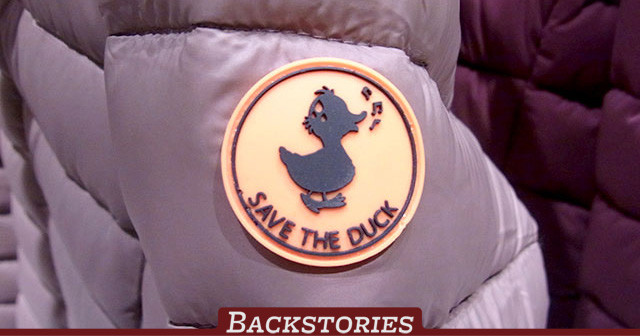 Italian brand Save The Duck, has led the way.As its name suggests, the company does not use any waterbird feathers to make its signature jackets and vests.Save The Duck was founded in the Italian fashion capital of Milan in 2012.CEO Nicolas Bargi has been a nature lover his whole life.He says he has always been skeptical about the use of actual waterbird feathers in jackets.After seeing many companies collapse as a result of the 2008 financial crisis and credit uncertainty in Europe, Bargi decided it was time for the fashion industry to change tack.”I thought that there would have to be a big cultural and social change for people in the future, and sustainability would become a very strong factor for the new generation,” he says.
Italian brand Save The Duck, has led the way.As its name suggests, the company does not use any waterbird feathers to make its signature jackets and vests.Save The Duck was founded in the Italian fashion capital of Milan in 2012.CEO Nicolas Bargi has been a nature lover his whole life.He says he has always been skeptical about the use of actual waterbird feathers in jackets.After seeing many companies collapse as a result of the 2008 financial crisis and credit uncertainty in Europe, Bargi decided it was time for the fashion industry to change tack.”I thought that there would have to be a big cultural and social change for people in the future, and sustainability would become a very strong factor for the new generation,” he says.
Bargi devised a way to recycle plastic bottles as an alternative to feathers.
The bottles are broken down and mixed with polyester fibers.One jacket uses 20 bottles, instead of six to eight waterbirds.And Save The Duck has quickly found thereâs an international demand for its products.It has expanded to 33 countries and territories, including Japan where it has launched a slew of pop-up stores nationwide.Feather-free in Japan In Japan, an entrepreneur from Osaka has turned to a tropical tree as another feather alternative.Fukai Kishow, the founder of KAPOK KNOT, started producing coats in 2019 that use material derived from kapok, a tree that grows in Southeast Asia, Central and South America, and Africa.
The fluffy fibers taken from its seeds have historically been used as stuffing for life jackets and soft toys.But it has not been widely used in clothing as its fibers are difficult to process.Fukai, 29, visited Indonesia two years ago to choose fiber suitable for jackets.He worked with farmers and researchers to pick out the perfect material and signed sales contracts.
He says Kapok fiber’s excellent moisture absorption and thermal retention capacity make it warmer than other natural materials.Kapok Knot coats come with a message in the packaging highlighting the low environmental impact of the production process.Fukai says he wants customers to appreciate the social value of his products.
“Enjoying fashion and thinking about the future are compatible,” he says.”I want to pursue both business and social responsibility.” Vice-President of Japan Ethical Initiative, Ikoma Yoshiko, says ethical brands are set to become main players in the fashion industry.”Investors have become increasingly critical of companies that do not consider environmental issues since the Sustainable Development Goals were adopted by the United Nations in 2015,” she says.
“I suppose fashion brands that are not environment-friendly will not be able to survive.” Ikoma has been tracking trends among younger consumers, particularly members of what is known as Generation Z.She says growing up with knowledge of climate change and other environmental issues has made them more sensitive of the effects of their spending decisions.”I believe that similar to the ‘digital transformation’ in the business world, which makes use of the latest technology, the fashion industry will undergo an ‘ethical transformation.'”.
